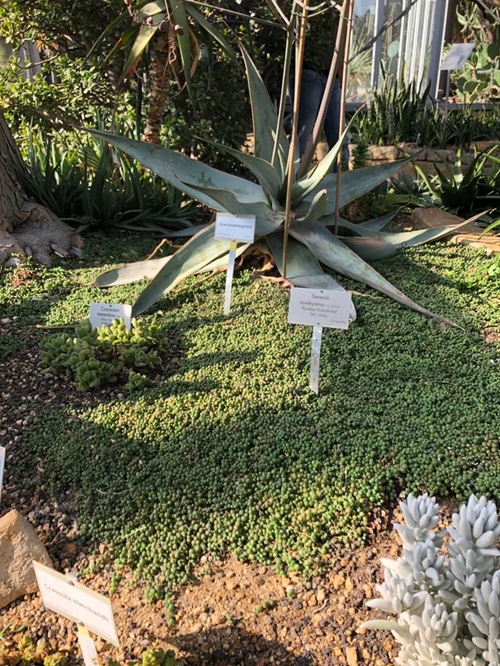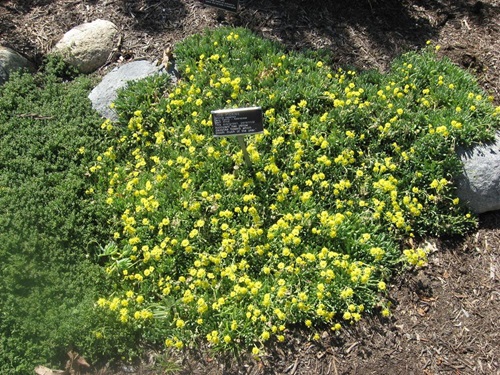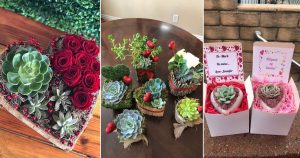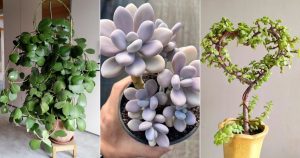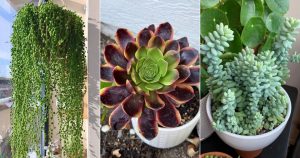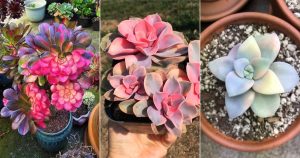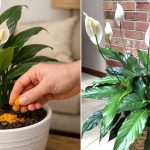Want to improve the health & sustainability of your garden? Say goodbye to high-maintenance lawns and hello to the Succulent Ground Covers.
Being down to earth is always the good thing about humans, and many plants also love to be like this. We are here with the list of the best succulent ground covers! They thrive in dry areas, protect soil from erosion, conserve moisture, and keep those pesky weeds at bay. So, let’s check out!
Best Succulent Ground Covers
1. Baby Sun Rose
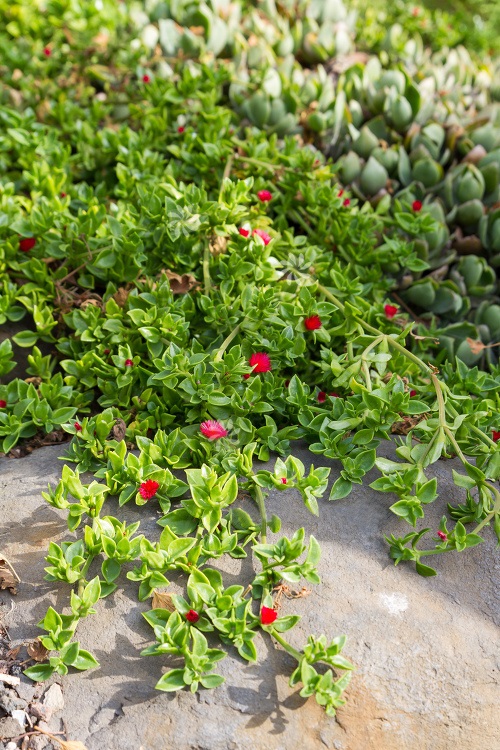
Botanical Name: Mesembryanthemum cordifolium
The Baby Sun Rose is a slow-growing and sun loving plant that shows its beautiful red-pink blossoms and a good amount of foliage. Apart from that, it is an excellent ground cover option for areas basked in sunlight and also demands very less water.
But remember to grow it in sandy or gritty soil, which helps to protect waterlogging.
2. Coppery Mesemb
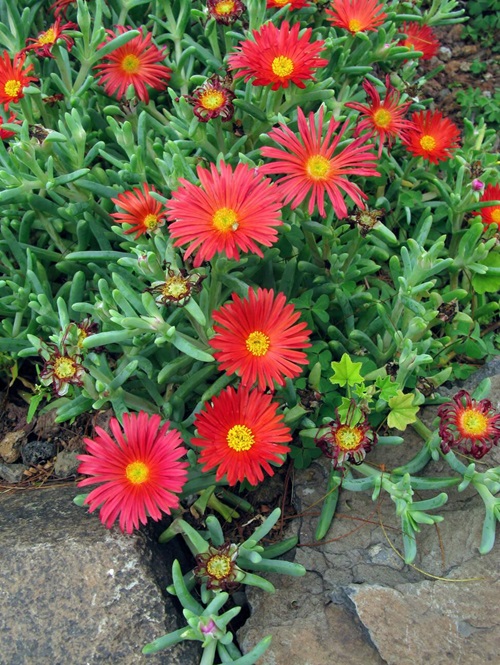
Botanical Name: Malephora crocea
Coppery Mesemb is all about bright, sunny vibes with its orange blooms with yellow centers. You should provide it with a spot that gets at least 6 hours of direct sunlight daily for the best flower production.
3. Jelly Bean Plant
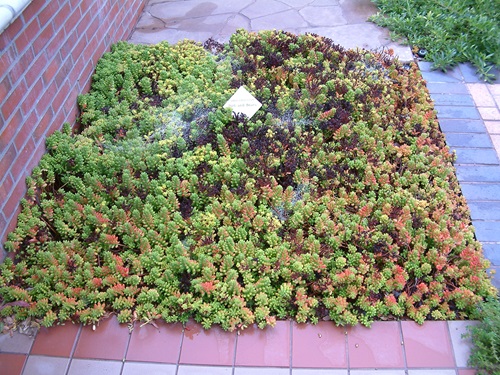
Botanical Name: Sedum rubrotinctum
Who doesn’t love jelly beans? It has mini-banana shaped leaves and in winter its green foliage with red tipped leaves turn glowing red in summer. Just be careful—its leaves can be a bit sensitive, so avoid bumping into them too much.
4. Tiger’s Jaw
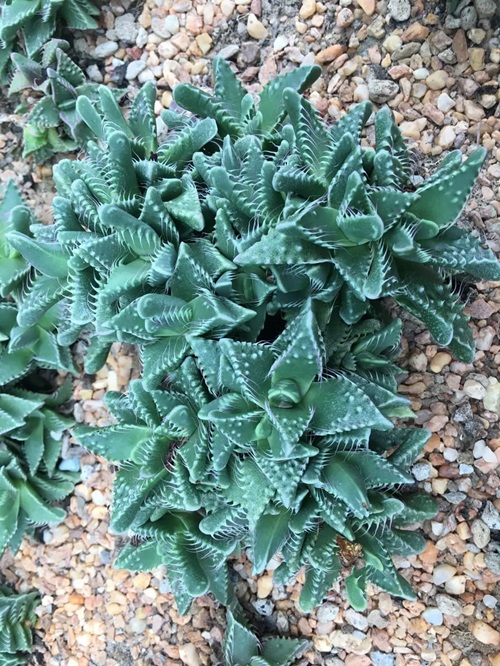
Botanical Name: Faucaria tigrina
Tiger’s Jaw is like the cool friend of your garden. It’s popular for its striped leaves, which make it a real eye-catcher. Also. it thrives in well-drained soil and loves a sunny spot.
Note: Gradually acclimate the plant to direct sunlight if it’s been indoors, as sudden exposure can cause sunburn.
5. Congested Ice Plant
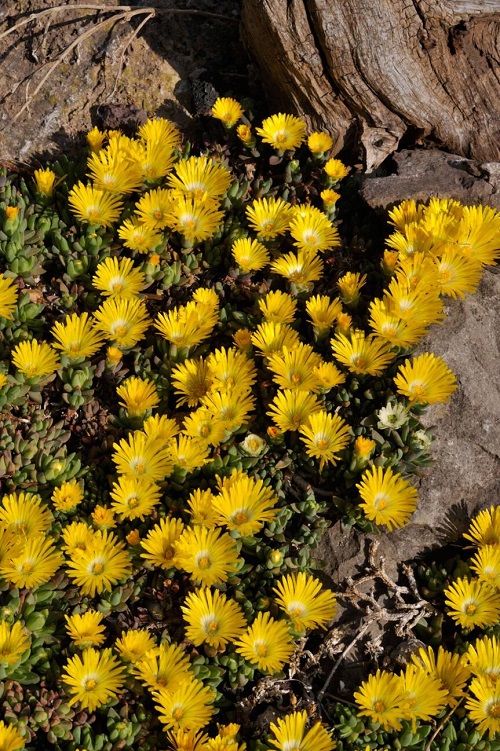
Botanical Name: Delosperma congestum L. Bolus
This low-growing succulent is like a living yellow carpet, perfect for covering slopes or preventing soil erosion. And, its dense mat of leaves not only looks great but also helps keep the soil in place.
Tip: Space the plants adequately to allow room for growth, as they can spread quite a bit.
6. Blue Elf
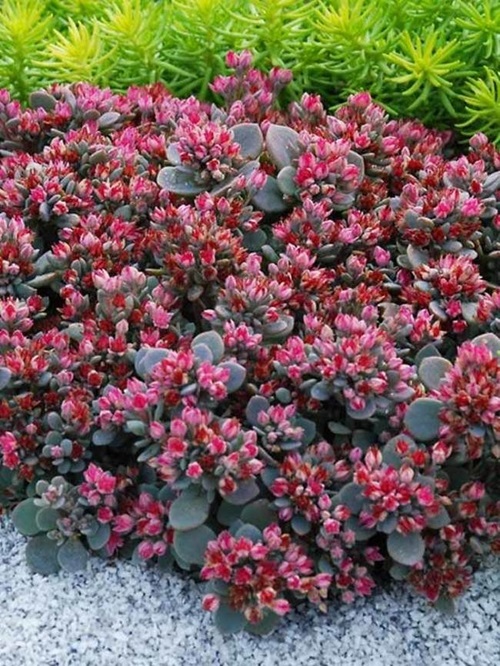
Botanical Name: Sedum x Sedoro ‘Blue Elf’
Blue Elf have beautiful blue-green foliage and pink flowers. Beyond this, it’s easy to care for and adaptable to different soil types. Its adaptability to different soil types makes it suitable for any garden.
Additionally, this plant is drought-tolerant but appreciates occasional watering during prolonged dry periods. Just make sure to water it deeply but infrequently to encourage a deep root system.
7. Woolly Senecio
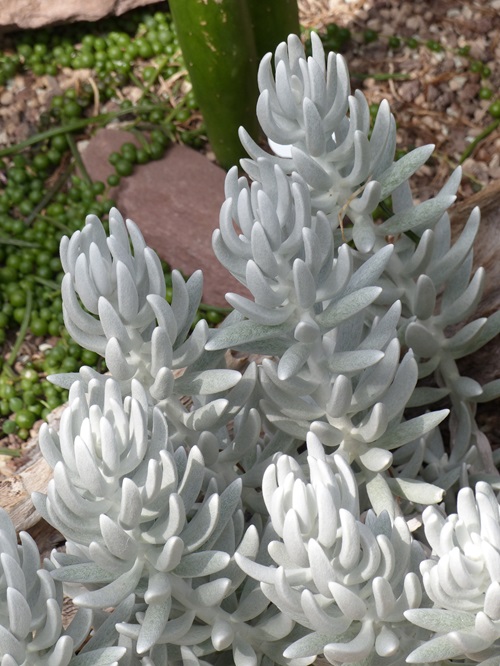
Botanical Name: Senecio haworthii
Isn’t it the best one in the list? With its white, woolly leaves, Woolly Senecio is a standout in any garden. Its leaves are unique in itself and are drought-tolerant to handle low water levels. Once you set it up, it’s a breeze to take care of—it’ll do the rest!
8. Rubber Hedgehog
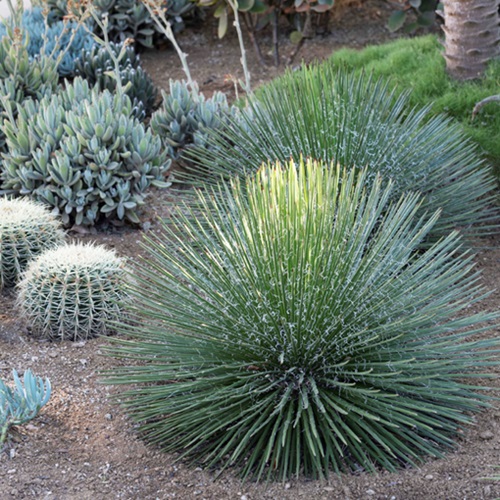
Botanical Name: Agave geminiflora
Rubber Hedgehog has long, narrow leaves like a hedgehog’s quill. It’s also drought-resistant and requires little maintenance once established.
Just plant it on a slight slope or raised bed to facilitate water runoff, especially in areas with heavy rainfall.
9. Dragon’s Blood
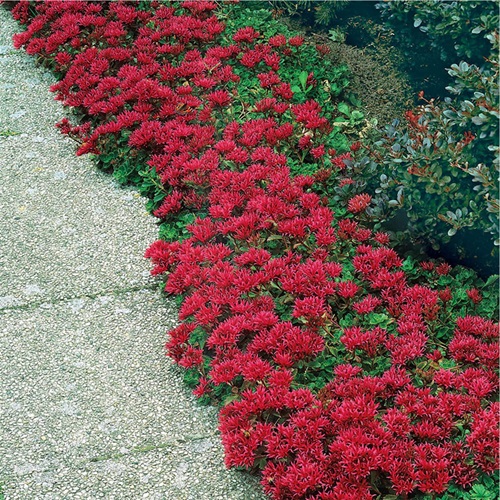
Botanical Name: Sedum spurium ‘Dragon’s Blood’
Dragon’s Blood is not as fierce as it sounds. With its rich, red-tinted leaves, it’s a beautiful ground cover that can thrive with minimal water. Apart from that, it’s tough, resilient, and a great choice for areas that get plenty of sun.
10. Angelina Stonecrop
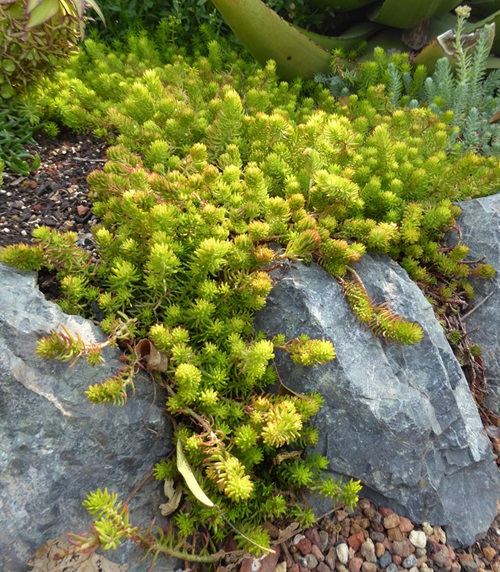
Botanical Name: Sedum rupestre ‘Angelina’
If you’re looking for bright yellow flowers, Angelina Stonecrop is your go-to. Its vibrant foliage looks beautiful when it spreads.
Angelina Stonecrop is versatile and durable, just trim it back in the spring to maintain a tidy appearance and encourage new growth.
11. Zwartkop
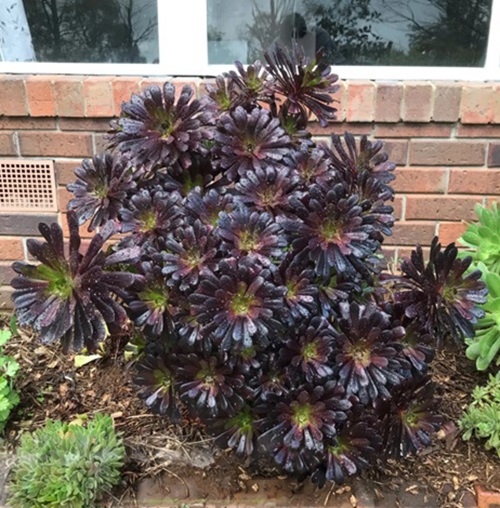
Botanical Name: Aeonium arboreum ‘Zwartkop’
These dark-hued leaves are actually adorable because of its bold contrast. Zwartkop loves to have good sunlight, otherwise it can become leggy. You can place this plant in full sun and turn the pot occasionally to encourage even growth.
12. Cape Blanco
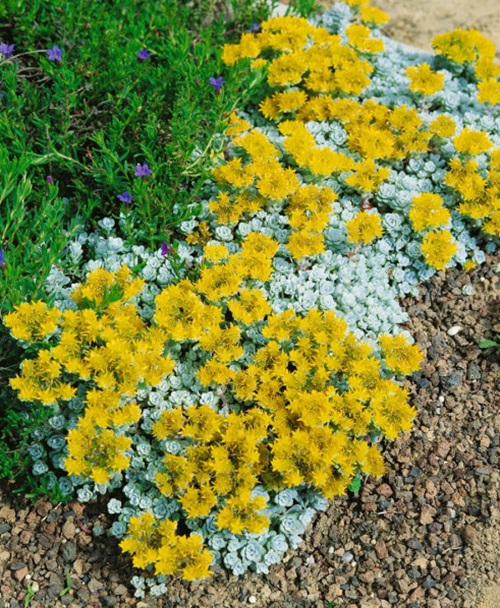
Botanical Name: Sedum spathulifolium
Cape Blanco’s powdery blue-gray leaves are a visual treat. This plant is versatile and can thrive in mixed plantings, making it a great filler plant. Its yellow flowers are a bonus, brightening up any garden space.
13. Shining Stonecrop
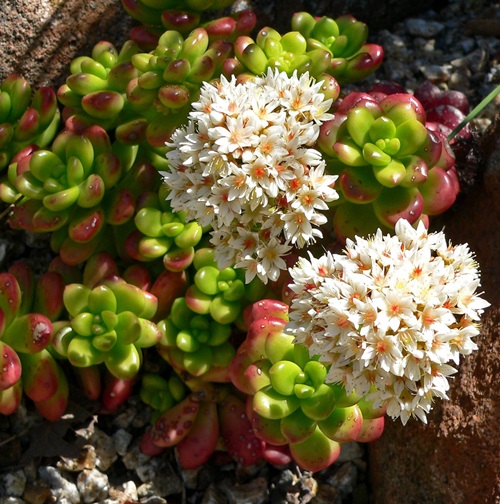
Botanical Name: Sedum lucidum
This one loves the sun and has shiny, emerald leaves. Shining Stonecrop is a sun-lover and does best in well-drained soil. Just be mindful of frost—like many succulents, it prefers a warmer climate.
14. Golden Ice Plant
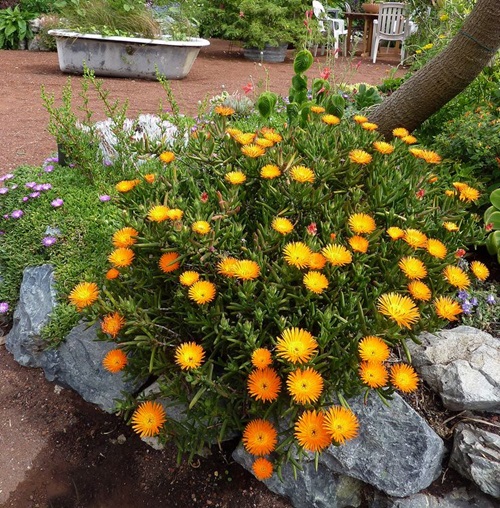
Botanical Name: Lampranthus aureus
Golden Ice Plant is all about those golden blooms. It’s perfect for dry areas where water is scarce, as it’s highly drought-resistant. Golden Ice Plant thrives in sandy or gravelly soil.
Just use a cactus or succulent soil mix to ensure good drainage and prevent root rot.
15. Mexican Sedum
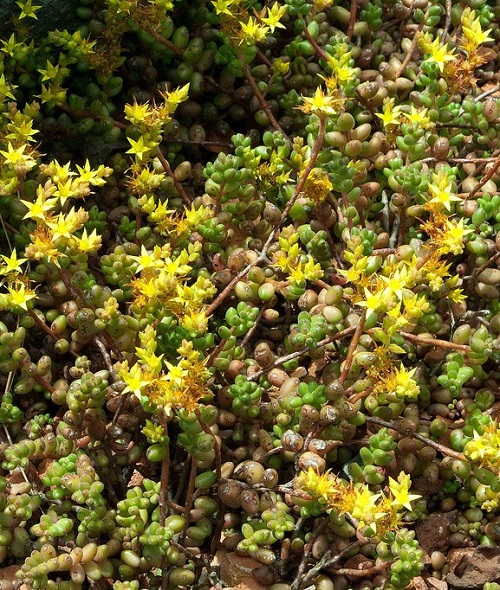
Botanical Name: Sedum stahlii
Mexican Sedum is a low-maintenance plant, so you can sit back and enjoy its yellow flowers without much demand. It can tolerate some shade, and it will look its best in full sun.
16. Wolf’s Jaw
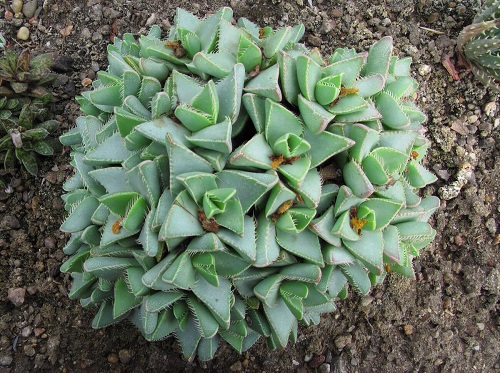
Botanical Name: Faucaria lupina
Wolf’s Jaw is named for its toothy leaves, which give it a distinctive look. Gardeners will find this low-maintenance succulent practical and effortless to tend to. It prefers a gritty soil mix and gives it plenty of light, and it will thrive.
17. Crassula
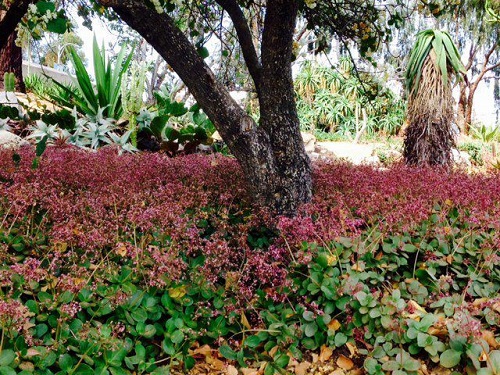
Botanical Name: Crassula multicava
Also known as Bride’s Bouquet, this Crassula variety is known for its dense foliage. It can flowers freely easily in spring. Plus, the cluster of pink and white flowers creates a round bouquet shape, hence its name!
18. Donkey Tail
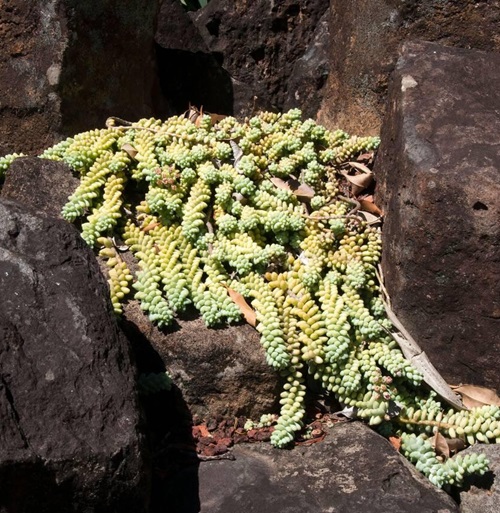
Botanical Name: Sedum morganianum
Donkey Tail is a quirky succulent that is best for hanging baskets or as ground cover. It is easy to care for, just remember that its leaves are very delicate and can fall off easily.
So, place it in a location where it won’t be bumped or jostled frequently, such as a high shelf or hanging basket.
19. Cobweb Buttons
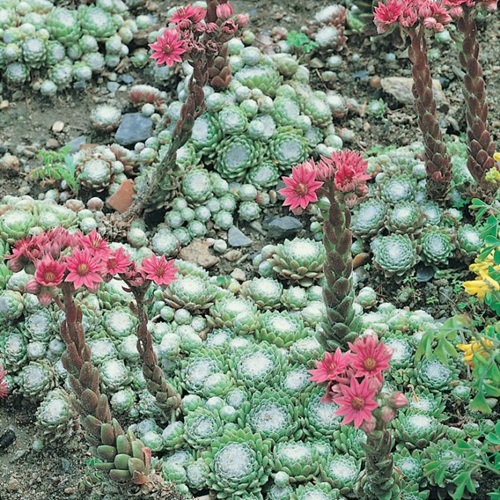
Botanical Name: Sempervivum arachnoideum
Cobweb Buttons are named for the fine white hairs that cover their rosettes, giving them a spiderweb-like appearance. They’re drought-tolerant and perfect for areas with limited water. Cobweb Buttons are hardy plants and prefer well-drained soil so plant them in a rocky or sandy soil mix to replicate their natural alpine environment.
20. Yellow Purslane
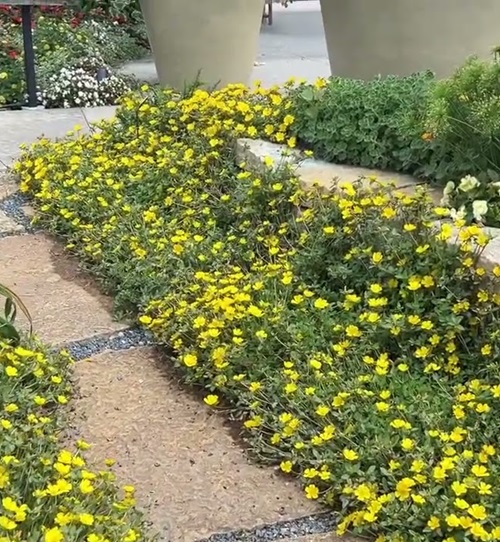
Botanical Name: Portulaca lutea
Yellow Purslane flourishes under direct sunlight; it thrives notably well in sandy soil. Its bright yellow flowers add a cheerful note to any garden, and it’s perfect for areas with poor soil. Just avoid overwatering, as it can lead to root rot and reduced flower production.
21. Kiss Me Quick
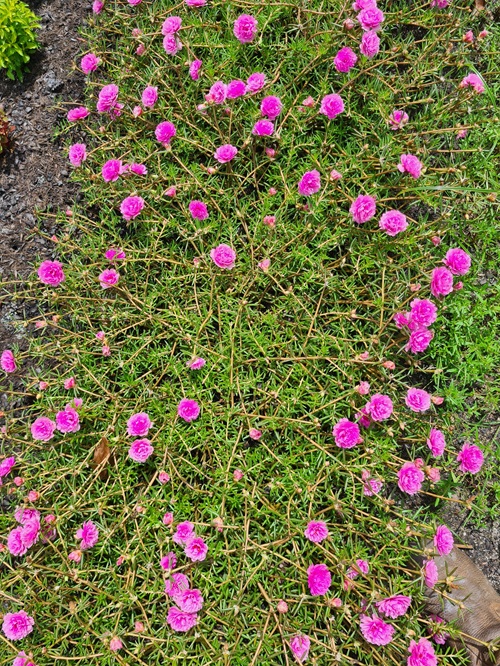
Botanical Name: Portulaca pilosa
What a unique name it has! The plant known as Kiss Me Quick is a wonderful choice for bright gardens that require minimal upkeep. It just prefers well-drained soil and full sun.
Note: It’s an annual plant, so it will need to be replanted each year, but it self-seeds readily.
22. Pig’s Ear
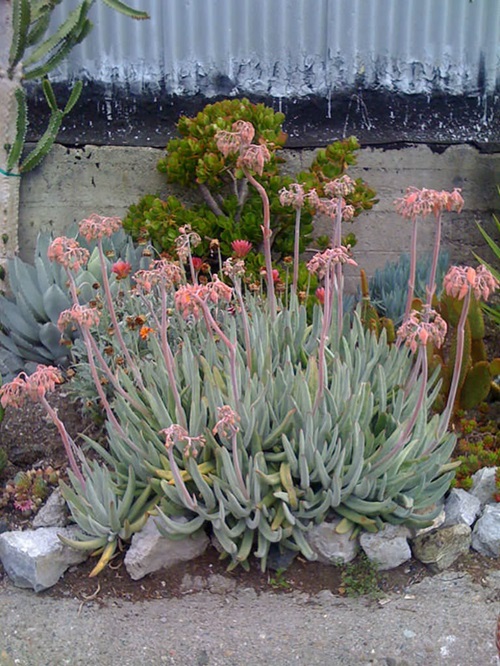
Botanical Name: Cotyledon orbiculata
Pig’s Ear gets its name from its plump, round leaves. Its orange blooms are just cherry on the cake! Pig’s Ear is a bit sensitive to frost and should be protected or moved indoors during cold weather. You can plant it in a container for easy mobility.
23. String of Beads
Botanical Name: Senecio rowleyanus
This pea-like or crystal-like succulent generally fits for hanging baskets but they are a good option for ground covers also. At the same time you have to be careful as it is a bit toxic and can cause skin irritation. Otherwise, it is a versatile plant which is fit for any garden.
24. Goldmoss Stonecrop
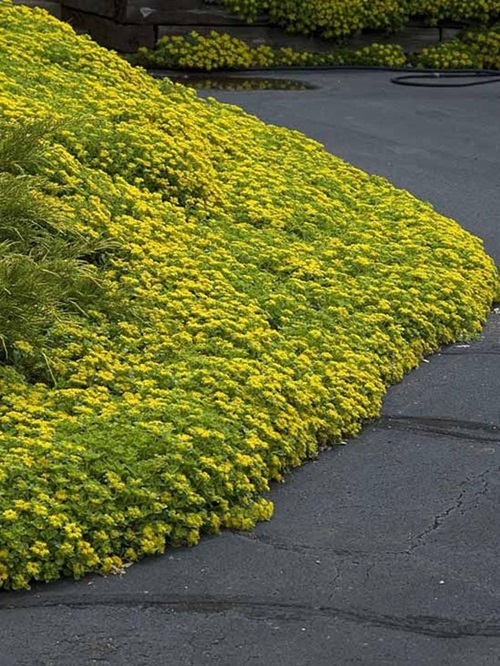
Botanical Name: Sedum acre L.
Goldmoss Stonecrop is a beautiful plant with bright yellow flowers. It’s great for attracting pollinators like bees. Plus, it’s also low-maintenance and thrives in poor soil. Goldmoss Stonecrop can spread aggressively. You can plant iit as in the picture above or in contained areas if you want to prevent it from overtaking other plants.
25. Ice Plant
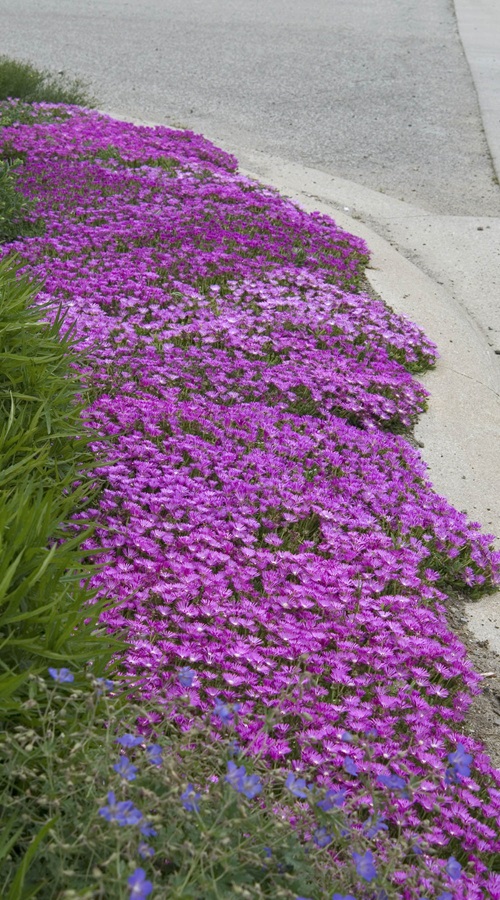
Botanical Name: Delosperma
Loved for its vibrant flowers and glossy leaves, this plant effortlessly enhances the beauty of any garden. Also, this plant is an excellent option for preventing erosion, as it effectively spreads and covers the ground.
Note: It can be invasive in some regions, so check local regulations before planting it widely.
26. Moss Rose
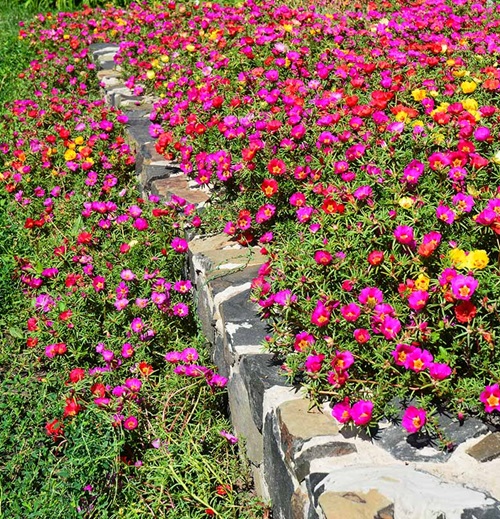
Botanical Name: Portulaca grandiflora
Moss Rose is highly favored among gardeners due to its rapid growth and wide range of color options. Additionally, its ability to thrive in unfavorable soil conditions makes it an ideal choice for areas with less-than-optimal soil quality. Also, make sure it receives plenty of sunlight for continuous blooming.
27. Hens and Chicks
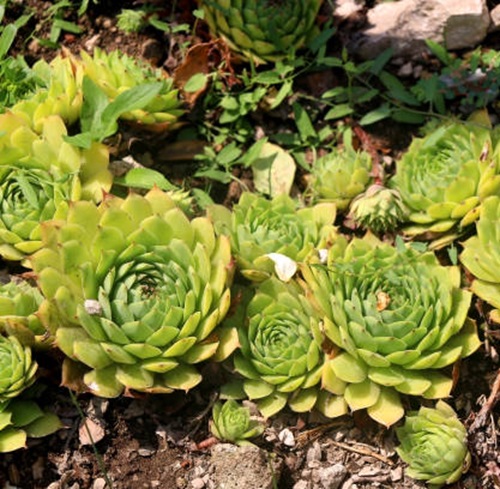
Botanical Name: Sempervivum tectorum
Hens and Chicks are exceptionally low-maintenance plants. Known for their rosette shape, with a large “hen” surrounded by smaller “chicks.” They’re also great for rock gardens and can thrive in poor soil.
28. Mexican Snowball
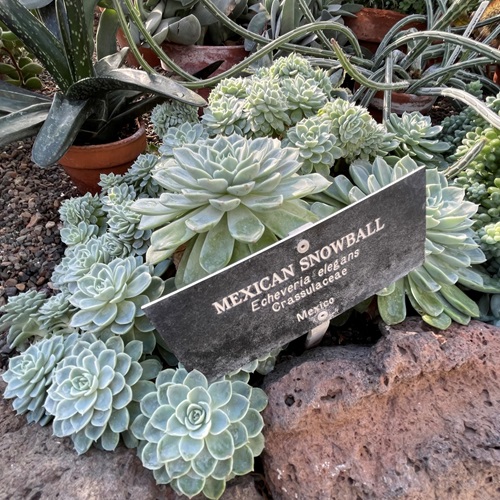
Botanical Name: Echeveria “Mexican Snowball”
Mexican Snowball is a beautiful succulent with blue-gray leaves and light pink blooms. It effortlessly spreads to fill spaces—scatter it, and you’re all set!
29. Little Pickles
Botanical Name: Othonna capensis
Little Pickles is a tough plant that can handle hot, dry conditions, which is why it is perfect for areas with arid climates. It resembles tiny pickles with daisy-like yellow flowers. Plus, it’s super low-maintenance and can tolerate neglect but will thrive with occasional watering during prolonged dry spells.
30. Baby Necklace D
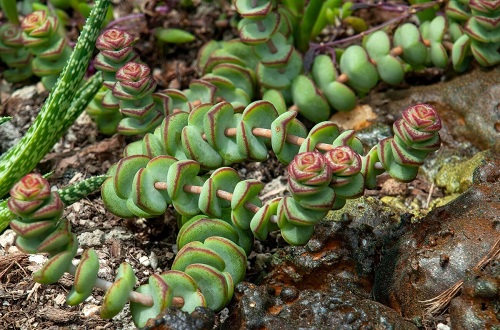
Botanical Name: Crassula cv. Baby Necklace
Baby Necklace is the perfect option for gardeners who have limited space. This succulent is compact and grows at a low angle so that’s why it is great fit for small yards and containers. Just ensure good airflow around the plant to prevent moisture buildup, which can lead to fungal issues.
31. Slenderleaf Iceplant
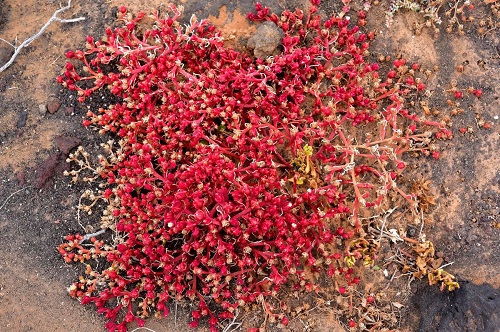
Botanical Name: Mesembryanthemum nodiflorum
Comes from the family of Ice plants, Mesembryanthemum nodiflorum is drought-tolerant and has delicate white flowers which can make any space beautiful. It’s an annual, so be prepared to replant it each year, though it often self-seeds.
32. Blue Chalksticks
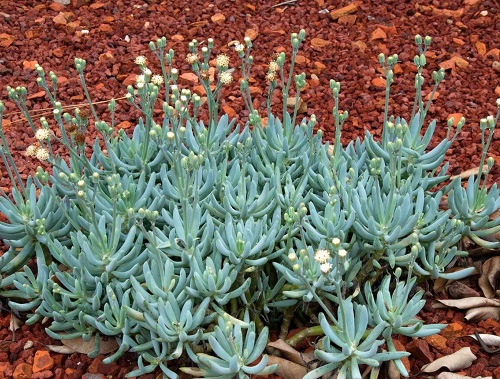
Botanical Name: Curio repens
This plant looks like a bunch of blue fingers growing together, which is why some people think of it as colorful chalk sticks. It is popular as ground cover because it spreads quickly while staying compact. Just make sure to plant it in sandy, well-draining soil that stays dry, as this plant doesn’t like having wet feet.
33. Sand Rose
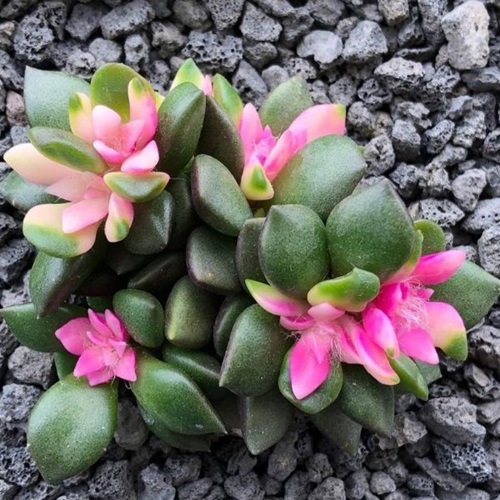
Botanical Name: Anacampseros rufescens
The Sand Rose succulent features spiraling rosettes of pointed leaves. The leaves are olive green on one side and pink on the other. It’s also very low-maintenance and easy to care for. Just prevent it from extreme temperatures.
So, now you have the proper list of low-growing succulents! Do you have a favorite succulent ground cover or a tip for caring for these plants? Share your experiences and tips in the comments below—we’d love to hear from you!

